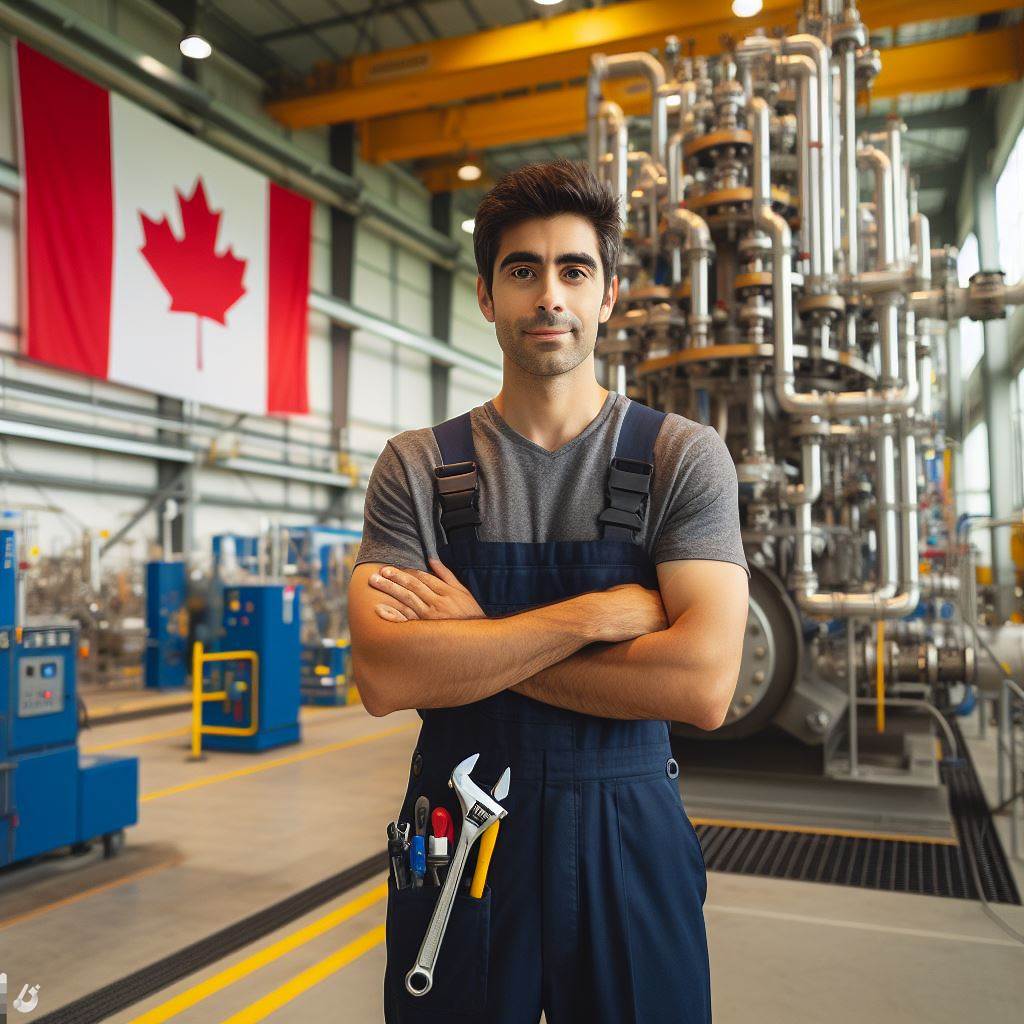Introduction
Proper education and training are crucial in the plumbing industry, and Canada offers top-notch plumbing schools and courses in 2024.
With the increasing demand for skilled plumbers in the country, choosing the right educational path becomes paramount.
Quality education and training are essential elements in the plumbing industry, ensuring that professionals possess the necessary skills and knowledge to provide top-notch services.
In Canada, numerous plumbing schools and courses cater to aspiring plumbers, equipping them with practical expertise.
The demand for skilled plumbers in Canada is on the rise, thanks to ongoing construction projects, home renovations, and infrastructure development.
Plumbers play a vital role in maintaining, repairing, and installing plumbing systems, making their expertise highly sought after in the country.
Choosing the right plumbing school or course is crucial for aspiring plumbers as it lays the foundation for their successful career.
The top Canadian plumbing schools provide comprehensive training, covering various aspects of plumbing, such as pipe fitting, drainage systems, and water supply.
In addition to technical skills, these schools often emphasize the importance of safety, regulations, and environmental awareness.
By receiving proper education and training, aspiring plumbers can ensure their competence and contribute to the growth of the plumbing industry in Canada.
Overall, the availability of top Canadian plumbing schools and courses in 2024 highlights the significance of proper education and training in the industry.
With the increasing demand for skilled plumbers, aspiring professionals must choose the right educational path to excel in their careers and meet the industry’s needs.
Factors to Consider When Choosing a Plumbing School
Choosing the right plumbing school is a critical decision that will significantly impact your career as a plumber.
When evaluating different options, there are several factors you should thoroughly consider to ensure you make an informed choice.
A. Accreditation and Certification
The first factor to consider is the accreditation and certification of the plumbing school.
Accreditation ensures that the institution meets specific standards and quality criteria, providing you with a valuable education.
Additionally, certification from recognized bodies in the plumbing industry adds credibility and enhances your employability.
B. Curriculum and Hands-on Training Opportunities
Another important aspect to examine is the curriculum offered by the plumbing school.
It should cover a wide range of plumbing techniques, codes, regulations, and industry best practices.
Practical hands-on training is equally crucial as it allows you to apply theoretical knowledge to real-world scenarios and develop essential skills.
C. Cost of Tuition and Financial Aid Options
The cost of tuition is a significant consideration for many students.
Research and compare the tuition fees of different plumbing schools to understand the financial commitment required.
Additionally, inquire about potential financial aid options such as scholarships, grants, or work-study programs that may help alleviate the financial burden.
D. Reputation and Track Record
The reputation of the plumbing school and its track record are important indicators of the quality of education you can expect.
Look for testimonials from current and past students to gain insights into their experiences.
Unlock Your Career Potential
Visualize a clear path to success with our tailored Career Consulting service. Personalized insights in just 1-3 days.
Get StartedIt is also beneficial to evaluate the success rate of graduates in finding employment or pursuing advanced plumbing certifications.
By carefully considering these factors, you can make an informed decision that aligns with your educational and career goals.
A well-respected plumbing school with proper accreditation and certification not only equips you with the necessary skills but also enhances your professional prospects.
The curriculum should provide comprehensive training covering various aspects of plumbing, including both theory and practical application.
Understanding the cost of tuition is essential for proper financial planning. Investigate potential financial aid options to reduce the burden of tuition fees.
Scholarships, grants, and other forms of assistance can make pursuing your plumbing education more affordable.
Lastly, the reputation and track record of the plumbing school are strong indicators of its quality.
A school with a positive reputation among graduates and employers demonstrates its ability to provide an excellent education that meets industry standards.
Research the success rates of graduates in terms of securing employment and opportunities for advancement.
In short, selecting the right plumbing school requires careful consideration of accreditation, curriculum, cost, and reputation.
Take the time to research and visit different institutions to get a holistic view of what they offer.
Remember that your choice of plumbing school will have a significant impact on your future career as a skilled and in-demand plumber.
Read: Networking for Electricians in Canada: Tips
Top Plumbing Schools in Canada
Are you interested in pursuing a career in plumbing in Canada? Look no further!
Here is a comprehensive list of the top plumbing schools in Canada for 2024:
A. George Brown College of Applied Arts and Technology
Located in Toronto, Ontario, George Brown College offers a top-notch plumbing program.
The program provides hands-on training, preparing students for real-world plumbing challenges.
The instructors at George Brown College are highly experienced and have extensive industry affiliations.
Unique Feature
George Brown College has state-of-the-art plumbing labs that simulate real plumbing scenarios, allowing students to gain practical skills.
B. Northern Alberta Institute of Technology (NAIT)
NAIT, situated in Edmonton, Alberta, offers a renowned plumbing program.
Students at NAIT receive training in both residential and commercial plumbing, and the curriculum covers a wide range of plumbing techniques.
The instructors at NAIT have vast industry knowledge and connections.
Unique Feature
NAIT provides students with opportunities for apprenticeships, giving them valuable on-the-job experience before completing their formal education.
C. British Columbia Institute of Technology (BCIT)
BCIT, located in Burnaby, British Columbia, is another top plumbing school in Canada.
The plumbing program at BCIT focuses on both theoretical knowledge and practical skills.
The instructors at BCIT are industry professionals who bring real-world insights to their teaching.
Unique Feature
BCIT offers a unique Plumbing Apprenticeship program, allowing students to earn while they learn through paid work terms.
D. Saskatchewan Polytechnic
Saskatchewan Polytechnic, with campuses in various cities including Saskatoon and Regina, offers an exceptional plumbing program.
The program emphasizes hands-on learning, ensuring students are well-prepared to enter the plumbing industry.
The instructors at Saskatchewan Polytechnic have extensive industry experience.
Unique Feature
Saskatchewan Polytechnic has strong connections with industry partners, providing students with potential job opportunities and networking prospects.
E. New Brunswick Community College (NBCC)
NBCC, located in Moncton, New Brunswick, offers a comprehensive plumbing program.
Students at NBCC learn various aspects of plumbing, including installation, maintenance, and repair.
The instructors at NBCC are highly skilled professionals with significant industry experience.
Unique Feature
NBCC offers small class sizes, fostering a supportive and personalized learning environment for students.
F. Algonquin College
Situated in Ottawa, Ontario, Algonquin College offers a well-regarded plumbing program.
The program focuses on developing a solid foundation in plumbing techniques and practices.
The instructors at Algonquin College are industry experts who provide valuable insights into the field.
Unique Feature
Algonquin College has a strong network of industry partners, facilitating potential employment opportunities for graduates.
These top plumbing schools in Canada provide excellent educational programs that equip students with the necessary knowledge and skills to succeed in the plumbing industry.
Consider your interests and location preferences, and choose the school that best suits your needs for a rewarding plumbing career!
Read: Troubleshooting Tips for Rookie Electricians

Plumbing Courses and Programs
A. Plumbing courses and programs offered by Canadian schools
Canadian schools offer a variety of plumbing courses and programs to aspiring plumbers.
These programs provide comprehensive training in the field of plumbing.
Students can gain both theoretical knowledge and practical skills required for a successful plumbing career.
Plumbing courses cover a wide range of topics, including plumbing systems, pipe installation, and repair techniques.
Students learn about plumbing codes, regulations, and safety practices to ensure quality workmanship.
B. Apprenticeship programs and their benefits
- Many Canadian plumbing schools offer apprenticeship programs in partnership with industry professionals.
- Apprenticeships provide hands-on training under the guidance of experienced plumbers.
- These programs allow students to earn while they learn, gaining practical experience in real-world plumbing projects.
- Apprenticeships also help students build valuable industry connections, enhancing their job prospects upon completion.
- Graduates from apprenticeship programs are highly sought after by employers due to their practical skills and work experience.
C. Specialized courses in pipefitting, gas fitting, and backflow prevention
- In addition to general plumbing courses, Canadian schools also offer specialized courses to enhance specific skills.
- Pipefitting courses focus on advanced pipe installation techniques and systems.
- Gas fitting courses provide training in the installation, repair, and maintenance of gas systems.
- Backflow prevention courses teach students how to prevent contamination in plumbing systems.
- These specialized courses allow plumbers to specialize in specific areas and broaden their career opportunities.
D. Skills and knowledge gained from plumbing programs
- Plumbing programs equip students with a wide range of skills essential for success in the plumbing industry.
- Students learn how to read blueprints and technical drawings for planning and executing plumbing projects.
- They acquire proficiency in using plumbing tools and equipment for various tasks.
- Plumbing programs also emphasize problem-solving skills, enabling students to troubleshoot and fix plumbing issues.
- Furthermore, students gain knowledge about sustainable plumbing practices and energy-efficient systems.
In general, Canadian plumbing schools and courses provide aspiring plumbers with comprehensive training and hands-on experience.
Whether through general plumbing programs, apprenticeships, or specialized courses, students can acquire the necessary skills and knowledge to excel in the industry.
Plumbing programs not only focus on technical expertise but also emphasize problem-solving abilities and sustainability.
By choosing a reputable Canadian plumbing school and enrolling in the right course, individuals can embark on a rewarding career in the thriving field of plumbing.
Read: Canadian Electricians: Union vs Non-Union
Admission Requirements and Application Process
A. Overview of Admission Requirements
To gain admission into plumbing schools in Canada, certain requirements need to be met.
These include:
- High School Diploma: Applicants must possess a valid high school diploma or equivalent qualification.
- Age Requirement: Students typically need to be at least 18 years old, though some schools may accept younger applicants.
- English Proficiency: Non-native English speakers may be required to submit proof of English language proficiency, such as IELTS or TOEFL scores.
- GPA: Some schools may have a minimum grade point average requirement for admission.
B. Application Process and Necessary Documentation
The application process for plumbing schools usually involves the following steps:
- Submitting an Application: Prospective students must fill out and submit the school’s application form, either online or in-person.
- Application Fee: A non-refundable application fee is often required, which covers the administrative costs of processing the application.
- Transcripts: Official high school transcripts need to be sent directly to the school from the applicant’s previous educational institution.
- Letters of Recommendation: Some schools may require one or more letters of recommendation from teachers or employers who can attest to the applicant’s character and abilities.
- Personal Statement: Applicants may be asked to provide a personal statement explaining why they are interested in pursuing plumbing as a career.
- Resume: A comprehensive resume outlining the applicant’s educational background, work experience, and any relevant certifications or licenses should be included.
- Interviews: Certain schools may conduct interviews to assess the applicant’s suitability for the program.
C. Specific Prerequisites and Prior Experience
In addition to the general admission requirements, plumbing schools may have specific prerequisites or preferences for prior experience, such as:
- Math and Science Courses: Some schools may require applicants to have taken courses in mathematics and science during high school.
- Technical Skills: Prior experience or knowledge in a related field, such as construction or engineering, may be advantageous but is not always mandatory.
- Entry Assessments: A few plumbing schools may administer aptitude tests or hands-on assessments to evaluate the applicant’s practical skills and problem-solving abilities.
D. Additional Selection Criteria
Apart from academic qualifications, some plumbing schools may consider the following factors during the selection process:
- Work Experience: Previous work experience in the plumbing industry can be an asset and may positively impact the applicant’s chances of admission.
- Personal Interview: Interviews allow schools to assess an applicant’s communication skills, motivation, and commitment to pursuing a career in plumbing.
- Diversity and Inclusion: Schools may prioritize diversity in their student body, considering factors such as gender, ethnicity, or background.
- Capacity and Class Size: Due to limited spots available, schools may consider the number of applicants against the program’s capacity when making admission decisions.
It is important for prospective students to carefully review the admission requirements, gather all necessary documentation, and submit their applications well before the stated deadlines.
By meeting these requirements and completing the application process, individuals can increase their chances of securing a spot in a respected Canadian plumbing school.
Read: Electrical Safety Standards in Canada Explained
Career Prospects and Opportunities for Plumbing Graduates
A. Growth Potential and Job Opportunities in the Plumbing Industry
The plumbing industry in Canada offers promising growth potential and numerous job opportunities.
With a growing population and increasing construction projects, the demand for skilled plumbers is on the rise.
Plumbing graduates can find employment in various sectors including residential, commercial, and industrial settings.
They can work for construction companies, plumbing contractors, maintenance departments, or even start their own business.
B. Average Salaries of Plumbers in Canada
Plumbers in Canada earn competitive salaries that reflect the skills and expertise they bring to the job.
On average, entry-level plumbers can expect to earn around $40,000 to $50,000 per year.
As they gain experience and specialize in specific areas such as pipefitting or gasfitting, their earnings can significantly increase.
Experienced plumbers can earn up to $70,000 to $80,000 annually, with some even surpassing the $100,000 mark.
C. Potential Career Paths and Advancements in the Field
A career in plumbing offers various paths for advancement and specialization.
Plumbers can choose to specialize in different areas such as commercial plumbing, pipefitting, gasfitting, or irrigation.
With further education and training, plumbers can also become supervisors, project managers, estimators, or even instructors at plumbing schools.
They can take on more challenging projects and lead teams, enhancing their skills and increasing their earning potential.
D. The Importance of Networking and Joining Professional Associations
Networking plays a crucial role in the career development of plumbing graduates.
By connecting with other professionals in the industry, they can gain valuable insights, learn about job opportunities, and build relationships that can lead to mentorship or partnerships.
Joining professional associations such as the Mechanical Contractors Association of Canada or the Canadian Institute of Plumbing and Heating provides plumbers with access to resources, educational programs, and industry events.
These associations offer networking opportunities and allow plumbers to stay updated on the latest advancements and regulations in the field.
In summary, the plumbing industry in Canada offers promising career prospects and opportunities for graduates.
With a growing demand for skilled plumbers, individuals can expect stable employment and competitive salaries.
By continuously upgrading their skills, networking, and joining professional associations, plumbers can advance their careers and achieve success in this dynamic industry.
Conclusion
A. Summarize Key Points
In this chapter, we explored the top Canadian plumbing schools and courses for 2024.
Highlights include programs at BCIT, NAIT, and SAIT. Each school offers specialized training crucial for a plumbing career.
B. Emphasize Choosing the Right School
Choosing the right plumbing school is paramount.
It determines the quality of your education and significantly impacts your future career prospects.
Consider factors like faculty expertise, facilities, and industry connections.
C. Encourage Thoughtful Research
Readers are urged to research diligently.
Consider course structures, accreditation, and alumni success.
This decision shapes your professional journey; a well-informed choice ensures a solid foundation for a successful plumbing career.
D. Closing Remark on the Plumbing Industry’s Future
As you embark on this educational journey, remember: the plumbing industry in Canada is thriving.
A skilled workforce is in demand. By choosing the right school, you position yourself for a promising and fulfilling future in this essential field.
Best of luck!




